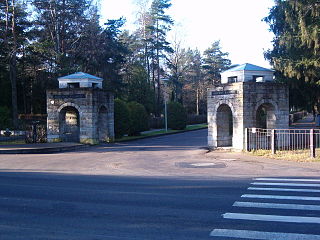
Jaan Ehlvest is an Estonian-American chess player. He was awarded the title Grandmaster by FIDE in 1987. Ehlvest was Estonian champion in 1986. Since 2006, he has represented the United States.

Jaan Kaplinski was an Estonian poet, philosopher, politician, and culture critic, known for his focus on global issues and support for left-wing/liberal thinking. He was influenced by Eastern philosophical schools.
Jaan is an Estonian masculine, a cognate of the English-language given name John.

Rahumäe Cemetery is a cemetery located at Rahumäe in Nõmme District, Tallinn, Estonia. This municipal cemetery was established in 1903 on 29 hectares of land to meet the needs of the growing population of Tallinn. A number of congregations are present including a Jewish section established in 1911. This forested cemetery is notable for its many works by famous sculptures and chapels present within its grounds.

Jaan Lattik was an Estonian politician, writer and a former Estonian Minister of Education and Minister of Foreign Affairs of Estonia.

Saru is a village in Rõuge Parish, Võru County in southeastern Estonia. Between 1991–2017 the village was located in Mõniste Parish.

The following is an alphabetical list of articles related to the Republic of Estonia.
Looming is the oldest literary magazine in Estonia. The headquarters is in Tallinn.

Erki Pehk is an Estonian conductor and artistic director of opera music festival PromFest.

Ott Arder was an Estonian poet, children's writer and translator. He was also the author of several popular songs and written texts.

Haljala is a small borough in Lääne-Viru County, in northern Estonia. It's located about 10 km northwest of the town of Rakvere, by the Tallinn–Narva road. Haljala is the administrative centre of Haljala Parish. As of the 2011 Census, the settlement's population was 1,084.

Käo is a village in Elva Parish, Tartu County in southern Estonia. It has a population of 52.

Heino Pehk is an Estonian choir conductor and music teacher.

Mother is a 2016 Estonian drama film directed by Kadri Kõusaar. It was selected as the Estonian entry for the Best Foreign Language Film at the 89th Academy Awards but it was not nominated.
Pehk is an Estonian surname. Notable people with the surname include:
Jaan Tooming was an Estonian actor, theatre and film director and writer.

Jaan Undusk is an Estonian writer, playwright and literary scholar.

Lõõtsavägilased is an Estonian folk music ensemble founded in 2014.

Melchior the Apothecary is a 2022 Estonian historical mystery film. It is the first instalment of the Melchior trilogy, based on the novels by Indrek Hargla. The film stars Märten Metsaviir as the apothecary Melchior Wakenstede, who solves crimes in medieval Tallinn. The film is directed by Elmo Nüganen.















